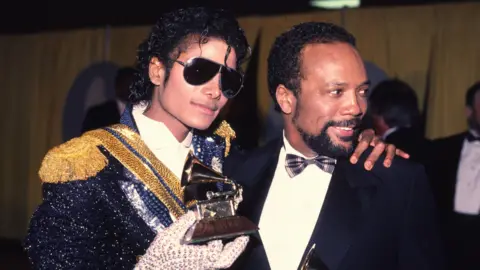Quincy Jones, the celebrated US musician and producer who worked with Michael Jackson, Frank Sinatra, Ray Charles and many others, has died at the age of 91.
Jones’ publicist, Arnold Robinson, said he “passed away peacefully” on Sunday night at his home in Bel Air.
“Tonight, with full but broken hearts, we must share the news of our father and brother Quincy Jones’ passing. And although this is an incredible loss for our family, we celebrate the great life that he lived and know there will never be another like him,” the family said in a statement.
Jones was best known as the producer of Michael Jackson’s Thriller album.
Over a career spanning more than 75 years, he won 28 Grammy Awards and was named as one of the most influential jazz musicians of the 20th century by Time magazine.
He worked closely with Sinatra and reworked the crooner’s classic Fly Me To The Moon, taking it from a waltz to a swing.
For the film The Wiz, Jones found himself working alongside a 19-year-old Michael Jackson. He went on to produce Jackson’s album Off the Wall and the pop star’s follow-ups Thriller – which sold 34 million copies int he US alone – and Bad.
In 1985, Jones gathered 46 of America’s most popular singers of the time, including Jackson, Bruce Springsteen, Tina Turner and Cyndi Lauper, to record We Are the World.
Jones co-wrote the song to raise money for those suffering from a devastating famine in Ethiopia. The record was the US equivalent to Band Aid’s Do They Know It’s Christmas.
The hit reached number one in the UK and the US and was performed at Live Aid.
 Getty Images
Getty ImagesJones also composed the soundtrack to more than 50 films and TV programmes including the 1969 British film, The Italian Job.
Michael Caine, who starred in The Italian Job, paid tribute to Jones on X, calling him “a titan in the musical world”.
“He was a wonderful and unique human being, lucky to have known him.”
Sir Elton John also praised Jones and said “nobody had a career as incredible” as him, writing: “He played with the best and he produced the best. What a guy. Loved him.”
TV producer Shonda Rhimes called him “a legend, a visionary, a pioneer”.
On the big screen, Jones produced the film The Color Purple, which introduced the public to two then unknown performers – Oprah Winfrey and Whoopi Goldberg.
Posting a tribute on Instagram, Goldberg said he was “one of a kind”.
On the small screen, he was one of the producers behind the hit TV show The Fresh Prince of Bel Air.
But it was music where Jones excelled – as well as winning multiple Grammys, including a legend award in 1992, he was also recognised by the Emmys, Tonys and Oscars.
Jones was married three times and had seven children, including music producer Quincy Jones III and actress Rashida Jones, known for the US version of The Office.
 Getty Images
Getty ImagesJones’ family said the music producer was “truly one of a kind” and “through his music and his boundless love, Quincy Jones’ heart will beat for eternity”.
One of the first to pay tribute was playwright Jeremy O’Harris, who wrote on X that Jones’ “contributions to American culture were limitless”, noting he was the first black person nominated for an Oscar for best score among his other achievements.
Rapper LL Cool J, who briefly dated Jones’ daughter Kidada Jones, said on Instagram that Jones was “a father and example at a time when I truly needed a father”.
He added: “Mentor. Role model. King. You gave me opportunities and shared wisdom. Music would not be music without you.”
Singer Victoria Monét said that Jones’ “legacy will live on forever and ever” and musician Nile Rodgers posted on X: “Rest in Power”.
Ice T also paid tribute and wrote: “Genius is a description loosely used but Rarely deserved. Point blank, Quincy was the MAN. I won my 1st Grammy with Quincy and I live with his Wisdom daily.”
Singer Darius Rucker said we had “lost one of the all time greats”, while British DJ Tony Blackburn wrote on X that Jones was a “musical genius”.
Montreux Jazz Festival CEO Mathieu Jaton, who worked alongside Quincy for many years, said the spirit of Jones “will forever resonate” with the festival’s history.
He added that Jones, as a co-producer in the 1990s, “helped elevate the festival to new heights”.





